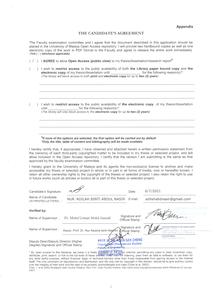Nur' Adilah, Abdul Nasir (2021) Miscible blend of polyethersulfone/polyimide membrane crosslinked with diamine for hydrogen/carbon dioxide separation / Nur 'Adilah Abdul Nasir. Masters thesis, Universiti Malaya.
Abstract
Hydrogen (H2)/carbon dioxide (CO2) separation application is crucial to fully utilize H2 gas as the next generation fuel source. Polyimide membranes have been intensively developed for H2 purification. However, polyimide has a low CO2 plasticization resistance and the separation performance of current neat polyimide membranes are insufficient to achieve industrial demands. Therefore, modification approach is required to overcome the limitation. Gas separation efficiency of mixed crosslinking agent on polyimide (PI) membrane is studied in this research by blending 1,3-diaminopropane (PDA) and 1,4-diaminobutane (BuDA) at different concentrations. It was found that the H2/CO2 selectivity increased significantly and H2 permeability decreased dramatically with higher concentration of PDA in crosslinking solution. Therefore, PDA is used as the crosslinking agent. Polyethersulfone (PES) and polyimide (P84) blend with three different ratios (25/75, 50/50 and 75/25 wt. %) are synthesized to form asymmetric membranes. Pure H2 and CO2 gas permeation tests were conducted on the polymer blends to find the best ratio for H2 purification. PES/P84 (75/25 wt. %) exhibits the highest H2 permeability value of 187.3 Barrer compared to all polymer blends tested. Next, chemical modification was carried out on the polymer blend ratio with superior H2/CO2 separation performance by immersing in PDA:methanol solution at different reaction times. After 15 minutes modification, the polymer membrane achieved an improvement on H2/CO2 selectivity by 96.9 % due to the increase in chain packing density and reduction in free volume caused by diamino crosslinking confirmed by XRD analysis. Hence, this study contributed significantly in improving H2 selectivity performance of the membranes.
Actions (For repository staff only : Login required)
![[img]](http://studentsrepo.um.edu.my/13222/1.hassmallThumbnailVersion/Nur_Adilah_Abdul_Nasir.jpg)


